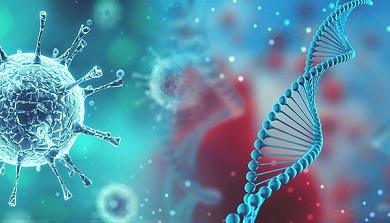COVID-19 Severity Linked To Mutations In Any 13 Different Human Genes Involved With Antiviral Defense According To Study By Rockefeller University
Source: COVID-19 Severity Sep 25, 2020 4 years, 6 months, 3 weeks, 4 days, 20 hours, 1 minute ago
COVID-19 Severity according to yet another study, this time by researchers from Rockefeller University is also linked to mutations in human genes but this time in a group of 13 genes associated with antiviral defense. Mutations in any one or more of these genes can also increase disease severity in those infected with the SARS-CoV-2 coronavirus.

The study findings were published in the journal: Science
https://science.sciencemag.org/content/early/2020/09/23/science.abd4570
Typically individuals infected by the novel coronavirus can have symptoms that range from mild to deadly.
Emerging new analyses suggest that some life-threatening cases can be traced to weak spots in patients' immune systems.
In the study it was found that at least 3.5 percent of patients with life-threatening COVID-19 have mutations in genes involved in antiviral defense according to study leader Dr Jean-Laurent Casanova, a Howard Hughes Medical Institute Investigator at The Rockefeller University.
Dr Casanova's study team, in collaboration with clinicians around the world, first began enrolling COVID-19 patients in their study in February. At the time, they were seeking young people with severe forms of the disease to investigate whether these patients might have underlying weaknesses in their immune systems that made them especially vulnerable to the virus.
The study team also scanned patients' genomes, in particular, a set of 13 genes involved in interferon immunity against influenza. In healthy people, interferon molecules act as the body's security system. They detect invading viruses and bacteria and sound the alarm, which brings other immune defenders to the scene.
Dr Casanova's team has previously discovered genetic mutations that hinder interferon production and function. Individuals with these mutations are more vulnerable to certain pathogens, including those that cause influenza. Finding similar mutations in individuals with COVID-19, the team thought, could help doctors identify patients at risk of developing severe forms of the disease. It could also point to new directions for treatment, he says.
Initially in March, Dr Casanova's team was aiming to enroll 500 patients with severe COVID-19 worldwide in their study. By August, they had more than 1,500, and they now have over 3,000. As the researchers began analyzing patient samples, they started to uncover harmful mutations, in people young and old. The team found that 23 out of 659 patients studied carried errors in genes involved in producing antiviral interferons.
Clinical outcomes upon infection with SARS-CoV-2 ranges from silent infection to lethal COVID-19. The study team found an enrichment in rare variants predicted to be loss-of-function (LOF) at the 13 human loci known to govern TLR3- and IRF7-dependent type I interferon (IFN) immunity to influenza virus, in 659 patients with life-threatening COVID-19 pneumonia, relative to 534 subjects with asymptomatic or benign infection. By testing these and other rare variants at these 13 loci, the team experimentally defines LOF variants in 23 patients (3.5%), aged 17 to 77 years, and
underlying autosomal recessive or dominant deficiencies.
The 13 identified genes included three loci previously shown to be mutated in patients with critical influenza pneumonia:
TLR3,
IRF7,
IRF9 and 10 loci mutated in patients with other viral illnesses but directly connected to the three core genes conferring influenza susceptibility ie
TICAM1/TRIF,
UNC93B1,
TRAF3, TBK1, IRF3 and
NEMO/IKBKG in the TLR3-dependent type I IFN induction pathway, and
IFNAR1 ,
IFNAR2 ,
STAT1 , and
STAT2 in the IRF7- and IRF9-dependent type I IFN amplification pathway.
The team found that human fibroblasts with mutations affecting these pathways are vulnerable to SARS-CoV-2. Inborn errors of TLR3- and IRF7-dependent type I IFN immunity can underlie life-threatening COVID-19 pneumonia in patients with no prior severe infection.
Besides the current research, Dr Casanova, and hundreds of other scientists involved with an international consortium called the COVID Human Genetic Effort are working to understand a second piece of the coronavirus puzzle ie instead of hunting for factors that make patients especially vulnerable to COVID-19, they're looking for the opposite genetic factors that might be protective. They're now recruiting individuals from the households of patients with severe COVID-19 ie individuals who were exposed to the virus but did not develop the disease. "Our lab is currently running at full speed," Dr Casanova added.
The study team concluded, “The autosomal recessive (AR) form of IFNAR1 deficiency highlights the importance of type I IFN production, relative to type III IFN, the production of which is also impaired by mutational defects of TLR3, IRF7, and IRF9. Inborn errors of TLR3- and IRF7-dependent type I IFN immunity at eight loci were found in as many as 23 patients (3.5%) of various ages (17 to 77 years) and ancestries (various nationalities, from Asia, Europe, Latin America and the Middle East), and in patients of both sexes. Our findings suggest that there may be mutations in other type I IFN-related genes in other patients with life-threatening COVID-19 pneumonia. “
The team also suggests that the administration of type I IFN may be of therapeutic benefit in selected patients, at least early in the course of SARS-CoV-2 infection.
Thailand Medical News would to add that emerging studies are also indicating that some of these mutations in these human genes can be 'reversed' or 'corrected' via induced epigenetic changes using phytochemicals from herbs. Thailand Medical News will be doing a feature on this along with supporting studies as it also involves certain of the therapeutic teas that we are developing.
https://www.thailandmedical.news/news/new-therapeutic-teas-
For more about
COVID-19 Severity, keep on logging to Thailand Medical News.
